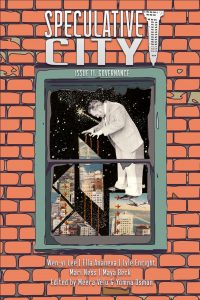Faren Miller reviews Richard E. Gropp
 Richard E. Gropp won the Del Rey Suvudu Writing Contest with first novel, Bad Glass, which explores a strangely plagued Spokane WA (in a time not too far from the present) through the first-person viewpoint and some of the work of lead character Dean Walker, who sneaks into a mostly evacuated city under military guard and lockdown, in hope of making his name as a photojournalist.
Richard E. Gropp won the Del Rey Suvudu Writing Contest with first novel, Bad Glass, which explores a strangely plagued Spokane WA (in a time not too far from the present) through the first-person viewpoint and some of the work of lead character Dean Walker, who sneaks into a mostly evacuated city under military guard and lockdown, in hope of making his name as a photojournalist.
He begins with descriptions of two photos, boxed and featuring ordinary typewriter text rather than the fancier Apollo type of the main narrative. The first of them – ‘‘the photograph you know’’ from its online appearance in a forum about Spokane – features a corpse in a grim concrete room, a dead soldier whose violated body sprouts a surreal appendage, an image summed up as ‘‘insanity, printed and framed. Pure insanity.’’ Some added comments, after the description, serve as an intro revealing that Dean has many more, ‘‘Countless inexplicable images locked up on my hard drive.’’ The next example, taken on a road outside the city, shows a living soldier (complete with a ‘‘pink bunny sticker’’ on the butt of his assault rifle) standing in front of a defaced sign that once said ‘‘ENTERING SPOKANE.’’ The juxtaposition of bizarre magic with quirky humanity in these pictures turns out to typify Dean’s (and the author’s) eye for detail, not just confined to the supernatural.
This keen awareness extends to Gropp’s sense of character, in portraits of the little groups of locals who didn’t flee when the strangeness began or as it continued to escalate. Though the first man Dean encounters, after several hours on streets that had started to seem totally deserted, is a self-serving creep, Wendell (AKA Weasel) isn’t lying when he describes the current version of city life: ‘‘There are vicious animals in the park, so you don’t go there after dark. There’s a warehouse on the east side – it’s been on fire for three months straight. So you stay the hell away. And if you see people in the street, people who shouldn’t be there, people whose feet don’t move when they walk….’’ Rather than say more, he shrugs, almost blasé about it all – but he does tell the newcomer: ‘‘And if you came here looking for reasons, you’re just wasting your time.’’
In the course of Dean’s adventures, he’ll hear plenty of weird theories, but even their looniest advocates still tend to have some seeds of doubt. What may be the best advice he gets simply sidesteps explanations. Before finding the confused outsider a place to stay, the genuinely benign (and attractive) woman Taylor tells him, ‘‘There’s a lot to see here. I don’t know what pictures and stories have made it out to the real world, but we’ve certainly got a lot to photograph.’’ She adds, ‘‘Not quite sure it’s smart to seek it out, but it’s certainly there.’’
Against the promptings of his own better judgment, even when the strangeness escalates to a murderous degree, Dean stays on to witness and portray it. I was going to say ‘‘document,’’ but that term might seem naive to the embittered older photographer who gives the book its title, as he tells our hero ‘‘you lie with pictures just like you lie with words. You can’t help it, you can’t control it…. All of that stuff turns dark. Through bad glass, it gets tainted.’’
Emotion, memories, or madness – any of them can destroy the purity of the image, and Dean comes to know them all. It’s ironic that, as a kind of coda to this tale, we get a stark governmental list of the contents of a black footlocker: photos, manuscripts, notebook entries, videos, computer, memory card, etc. – everything that helped turn the chapter introductions into something like a chilling collage, reduced here to mere objects. One further list deals with the major characters, referenced as a numerical sequence of ‘‘cases,’’ with notes on their presumed fates (some still live, though the majority are MISSING or DECEASED).
What happened in, and to, the city of Spokane? Not even Uncle Sam’s investigators may ever really know.








As of December 9, the ‘frontpage’ is still showing “Faren Miller Reviews Lois McMaster Bujold”, though …
My bad; wish you had emailed me and pointed it out. It’s fixed now!